Last updated on June 21st, 2024 at 09:44 pm
The Olympic Games in ancient Greece were a major sporting and cultural event that took place every four years in Olympia, a sanctuary dedicated to the god Zeus.
The Games were part of a broader religious festival and were one of the most important and prestigious athletic competitions in the ancient Greek world. Here are key aspects of the Olympic Games:
Olympics Origins and History
Origin: The Olympic Games are believed to have originated in ancient Greece around 776 BCE, although some sources suggest earlier dates. The first recorded Olympiad is traditionally attributed to Coroebus of Elis, a cook who won the stadion race.
Frequency: The Games were held every four years, known as an Olympiad, creating a system called the quadrennial cycle.
Venue

Location: The Games were held in Olympia, a sacred site located in the western part of the Peloponnese peninsula.
Sanctuary of Zeus: Olympia was home to the Temple of Zeus, where a colossal statue of Zeus, one of the Seven Wonders of the Ancient World, stood. The games were held in honor of Zeus.
Athletic Contests in Ancient Olympics
The ancient Olympic Games featured a variety of sporting events that showcased the physical prowess and skills of the athletes. The number and nature of events evolved over time, but the core competitions remained consistent throughout much of the ancient Games. Here are some of the main sporting events:
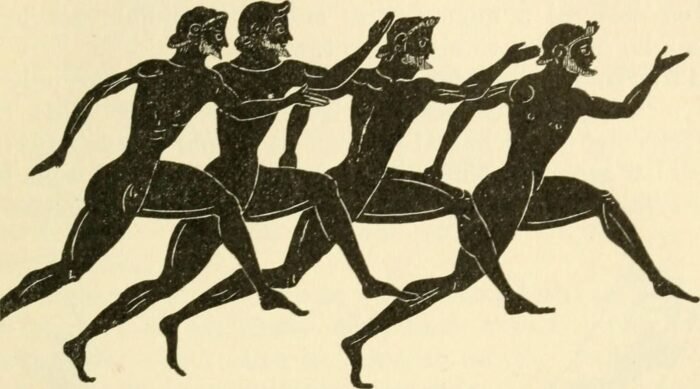
- Stadion (Stade Race): The stadion was the oldest and most prestigious event in the ancient Olympics. It was a sprint of approximately 192 meters (200 yards), and the victor of this race was often considered the overall champion of the Games.
- Diaulos (Two-Stade Race): Introduced in 724 BCE, the diaulos was a longer footrace, roughly 384 meters (400 yards), consisting of two lengths of the stadion.
- Dolichos (Long-Distance Race): The dolichos was a long-distance race introduced in 720 BCE. The exact length varied, but it could be up to 24 stades (about 4,800 meters or 3 miles).
- Pentathlon: The pentathlon was a combination of five events: stadion, wrestling, long jump, javelin throw, and discus throw. The winner of the pentathlon was considered an all-around athlete.
- Wrestling: Wrestling was a popular event in which athletes competed in a series of rounds, attempting to throw their opponents to the ground three times.
- Boxing: Boxing matches consisted of rounds during which competitors aimed to land blows on their opponents. Unlike modern boxing, there were no weight classes, and fighters did not use gloves.
- Pankration: Pankration was a brutal and versatile combat sport that combined elements of boxing and wrestling. Almost anything was allowed, except for biting and gouging. Pankration was considered one of the toughest events, and the victor was highly esteemed.
- Long Jump: The long jump involves athletes attempting to cover the greatest distance in a single leap.
- Javelin Throw: The javelin throw requires athletes to hurl a javelin for distance. The technique involved both precision and strength.
- Discus Throw: In the discus throw, athletes compete to throw a heavy discus (a flat, circular object) the farthest distance.
- Chariot Racing: Chariot racing was an equestrian event in which teams of horses, often pulling two-wheeled chariots, raced around a track. This event was introduced later in the history of the Olympic Games.
It’s important to note that the specific events and their order could change over time, and not all events were included in every edition of the Games. Additionally, the ancient Olympic Games featured events for both men and boys, with separate competitions held on different days. The emphasis on physical fitness, skill, and competitive spirit in these events contributed to the enduring legacy of the Olympic Games.
In ancient Greece, winning an event at the Olympic Games was a tremendous honor and brought great prestige to the victor and their hometown. Here are some key aspects of Olympic victors and the recognition they received:
Crown and Honors
- Olive Wreath: The most iconic prize for Olympic victors was the kotinos, a wreath made from the branches of the sacred wild olive tree of Olympia. The victors would be crowned with this wreath, symbolizing their achievement.
- Recognition and Status: Olympic victors were celebrated as heroes and were often given special privileges and honors in their home city-states. The victories brought great honor not only to the individual but also to their family and community.
Poetic Tribute
- Paeans and Odes: Poets, most notably Pindar, composed victory odes known as paeans to honor the Olympic victors. These poems extolled the virtues and achievements of the athletes, linking their success to divine favor.
Statues and Memorials
- Statues at Olympia: Statues of Olympic victors were often erected in Olympia as a permanent tribute to their accomplishments. These statues served as a lasting testament to the athlete’s prowess and as an inspiration for future generations.
- Trophy Monuments: In some cases, victors’ hometowns erected trophy monuments to commemorate their achievements, serving as a point of local pride.
Financial Rewards
- Pecuniary Prizes: While the primary rewards were symbolic and honorary, some city-states did offer financial incentives to their victorious athletes.
Heroic Status
- Cult Status: Exceptional Olympic victors could achieve cult status, with their achievements celebrated in rituals and festivals. Some victors were even worshiped as minor deities in certain regions.
Social and Political Influence
- Political Influence: Olympic victories could elevate an individual’s social and political standing. Successful athletes might be invited to participate in diplomatic missions or hold public offices.
- Civic Privileges: In some cases, Olympic victors were exempted from certain civic duties, as their athletic accomplishments were seen as contributing to the glory of their city-state.
Enduring Legacy
- Family Honor: Victorious athletes brought honor not only to themselves but also to their families. The achievements of an Olympic victor became part of the family’s legacy.
- Educational Impact: The stories of Olympic victors were often used as moral and educational examples for young Greeks, emphasizing the values of discipline, hard work, and determination.
Impact on Athletics
- Influence on Training: The training methods and achievements of Olympic victors were studied and emulated by aspiring athletes, contributing to the development of athletic techniques.
- Historical Recognition: Even after their deaths, Olympic victors continued to be remembered and praised, contributing to the historical record of ancient Greece.
The recognition and rewards for Olympic victors extended beyond personal glory, influencing the culture, society, and legacy of both the individual athlete and their city-state. The Olympic Games played a crucial role in shaping the ideals of ancient Greek society and continue to inspire the modern Olympic movement.
Participants and Eligibility
Participation in the ancient Olympic Games was restricted to freeborn Greek men who met specific eligibility criteria. The criteria for eligibility evolved over time, and the following were the general requirements during the classical period of the ancient Olympic Games:
- Greek Citizenship:
- Participants had to be freeborn Greeks, meaning they could not be slaves or foreigners.
- Citizenship in a Greek city-state was a fundamental requirement. Athletes were required to represent their home city-state in the Games.
- Gender Restrictions:
- Only men were allowed to compete in the ancient Olympic Games. Married women were prohibited from attending the Games, even as spectators.
- Age Requirements:
- Competitors had to be young men. The standard age range for participants was typically 18 to 24 years old.
- Boys were also allowed to participate in separate events, known as the “boys’ division,” which included similar athletic contests.
- Training and Preparation:
- Athletes were required to undergo rigorous training for at least ten months leading up to the Games.
- Training typically included physical conditioning, skill development, and preparation for specific events.
- Oath and Olympic Truce:
- Athletes, trainers, and officials had to swear an oath before participating in the Games, promising to abide by the rules and compete fairly.
- The Olympic Truce, a temporary suspension of hostilities among the Greek city-states, allowed safe passage for athletes and spectators traveling to and from Olympia.
- Eunomia (Good Order):
- Athletes were expected to conduct themselves with good behavior and adhere to the principles of eunomia, meaning “good order” or “good governance.”
- Unethical behavior, such as bribery or cheating, was severely punished.
- Health and Physical Condition:
- Athletes were required to pass a series of tests to ensure they were in good health and physical condition. This included a nude examination to confirm that competitors were not hiding any prohibited items, and it emphasized the importance of displaying the human body in its natural form.
- Travel Expenses:
- Participants were responsible for their travel expenses to and from Olympia. This requirement could be challenging for some athletes, particularly those from less affluent city-states.
It’s important to note that while the ancient Olympic Games had strict eligibility criteria, the emphasis was on the participation of citizens in a spirit of friendly competition and celebration of physical excellence. The Games were not solely about individual achievement but also about fostering a sense of unity and camaraderie among the Greek city-states.
Tradition and Ceremonies
The ancient Olympic Games were not just about athletic competition; they were deeply embedded in religious, cultural, and social traditions. The ceremonies and rituals associated with the Games played a crucial role in shaping the overall experience for both participants and spectators. Here are key elements of the tradition and ceremonies in the ancient Olympic Games:
1. Olympic Truce
- Before and during the Games, a sacred truce, known as the Olympic Truce, was observed. The truce ensured a cessation of hostilities and allowed safe passage for athletes, spectators, and officials traveling to and from Olympia.
2. Altar of Zeus
- The Games were held in the sanctuary of Olympia, dedicated to the god Zeus. The centerpiece was the grand Temple of Zeus, which housed a colossal gold and ivory statue of Zeus, one of the Seven Wonders of the Ancient World.
3. Opening Ceremony
- The opening ceremony marked the commencement of the Games and included various rituals and processions.
- Athletes, trainers, and officials gathered in the Altis (sacred grove) for the official opening.
- The ceremony featured sacrifices to the gods, often beginning with a procession to the Temple of Hera, where oxen were sacrificed to honor the goddess.
4. Lighting of the Olympic Flame
- The Olympic flame had symbolic significance and represented the sacred fire stolen from the god Zeus by Prometheus.
- The flame was kindled by the sun’s rays using a parabolic mirror, and it burned throughout the Games.
5. Procession of Athletes
- Athletes marched in a formal procession from the city of Elis to Olympia, led by the official herald. The procession, known as the “Herald’s Cry,” proclaimed the sacred Olympic truce.
6. Oath
- Athletes, trainers, and officials swore an oath before a statue of Zeus, pledging to compete fairly and abide by the rules of the Games.
7. Competitions
- Athletic contests took place in the stadium, gymnasium, and hippodrome, each with its own rituals and traditions.
- The stadium (sprint) race, considered the premier event, often took place on the first day of the Games.
8. Judges and Referees
- Judges, known as hellanodikai, were responsible for enforcing the rules and ensuring fair competition.
- The hellanodikai held a prominent role in the religious aspects of the Games and participated in various rituals.
9. Victor’s Crown
- The victors were crowned with an olive wreath, the kotinos, symbolizing their achievement. This was one of the highest honors bestowed upon them.
10. Closing Ceremony
- The closing ceremony included a feast, celebrations, and a proclamation of the winners.
- Victors were often given additional honors upon their return to their home city-states.
11. Statues and Monuments
- Victorious athletes were often commemorated with statues and monuments in Olympia, their hometowns, and other significant locations.
12. Cultural and Educational Events
- The Olympic Games were not just about sports; they also featured cultural events, including music, poetry, and philosophical discussions.
13. Legacy
- The traditions and ceremonies of the ancient Olympic Games left a lasting legacy, influencing the structure and rituals of subsequent Olympic Games, including the modern Olympics.
The ancient Olympic Games were a multifaceted celebration that combined physical competition with religious and cultural elements. The ceremonies and traditions added depth and meaning to the Games, fostering a sense of unity and shared identity among the diverse city-states of ancient Greece.
Panhellenic Nature
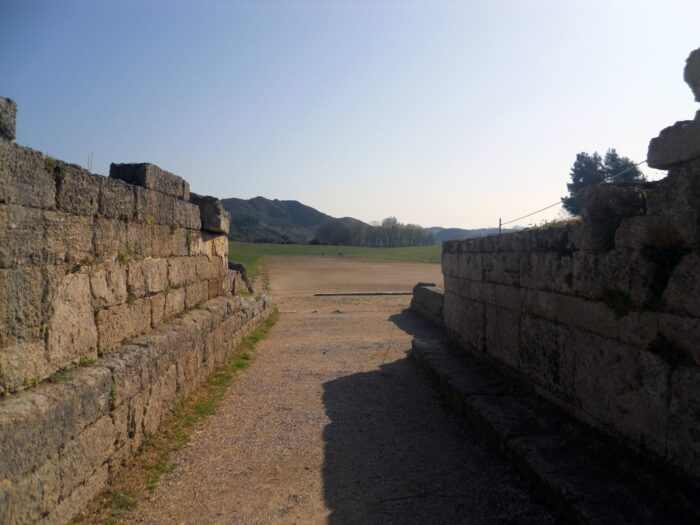
The ancient Olympic Games held in Olympia, Greece, were not just a local or regional event; they were deeply rooted in the Panhellenic spirit, encompassing the entire Greek world. The Panhellenic nature of the Olympics is characterized by its broader significance, drawing participants and spectators from various city-states and fostering a sense of unity among the Greek people. Here are key aspects of the Panhellenic nature of the ancient Olympic Games:
1. Participation from Various City-States
- The Games were open to athletes from all Greek city-states (polis). Competitors came from places as far as Sicily, Ionia, and the Greek colonies in Asia Minor.
- Athletes were not just representing themselves; they were seen as representatives of their city-states, adding a collective and civic dimension to the competition.
2. Olympic Truce
- The Olympic Truce, a temporary suspension of hostilities among the Greek city-states, allowed safe travel for athletes, officials, and spectators to and from Olympia.
- The truce reflected the belief in the sacredness of the Games and emphasized the common cultural and religious ties that bound the Greek world.
3. Religious Significance
- The Games were held in honor of Zeus, the chief deity in the Greek pantheon. Olympia, the sanctuary where the Games took place, was considered a sacred and neutral ground.
- The religious rituals associated with the Games, including sacrifices and ceremonies, reinforced the sense of a shared spiritual heritage among the Greeks.
4. Four Panhellenic Games
- The Olympics were part of a broader tradition of Panhellenic Games, which also included the Pythian Games at Delphi, the Nemean Games, and the Isthmian Games. Each of these events occurred on a four-year cycle.
5. Unity Through Athletics
- The shared experience of athletic competition at the Olympics fostered a sense of unity and common identity among the diverse Greek city-states.
- The idea of Greeks coming together to compete and celebrate physical excellence helped to bridge political and regional differences.
6. Cultural and Educational Exchange
- The Games provided a platform for cultural exchange, not only through athletic competition but also through events like music, poetry, and philosophical discussions.
- Intellectual and cultural activities complemented the physical contests, contributing to a holistic celebration of Greek civilization.
7. Honoring Greek Heroes
- The victories of individual athletes were celebrated not just by their home city-states but by the entire Greek world. Poets like Pindar composed victory odes that praised the achievements of athletes and elevated them to the status of Greek heroes.
8. International Recognition
- Winning at the Olympics brought international recognition and prestige to both the victor and their city-state. The victories were seen as a source of pride for the entire Greek world.
9. Legacy and Inspiration
- The Panhellenic nature of the Olympics influenced the development of the modern Olympic Games, which were revived in the late 19th century by Pierre de Coubertin. The idea of bringing together athletes from around the world for a peaceful competition can be traced back to the ancient Greek concept of Panhellenism.
The Panhellenic nature of the ancient Olympic Games played a crucial role in promoting a sense of unity, shared values, and cultural ties among the diverse city-states of ancient Greece. It contributed to the creation of a broader Greek identity that transcended regional and political differences, emphasizing the common bonds that connected the various Greek communities.
Legacy
The ancient Olympic Games represented more than just athletic competition; they were a celebration of Greek culture, religious devotion, and the ideals of physical and moral excellence.
The legacy of the ancient Olympics lives on in the modern Olympic Games, which continue to be a symbol of international unity and sportsmanship.
Here are key aspects of the legacy of the Olympics:
Ancient Olympics
- Cultural and Religious Significance:
- The ancient Olympics were deeply embedded in Greek culture and religion, serving as a celebration of physical prowess and a tribute to the gods, particularly Zeus.
- The religious rituals and ceremonies associated with the Games contributed to the cultural identity of ancient Greece.
- Pan-Hellenic Unity:
- The Olympics fostered a sense of unity among the diverse Greek city-states, as athletes and spectators from different regions came together to celebrate athletic competition.
- The Olympic Truce, a temporary suspension of hostilities, exemplified the idea of unity through sports.
- Influence on Art and Literature:
- The achievements of Olympic victors became popular subjects for art and literature. Poets like Pindar composed victory odes, and statues commemorating victors were erected in various locations.
- Philosophical and Educational Impact:
- The Olympics contributed to the Greek ideal of holistic education, emphasizing the development of both mind and body.
- Philosophers like Plato and Aristotle discussed the educational value of athletics in shaping well-rounded individuals.
Modern Olympics
- International Sporting Event:
- The modern Olympic Games, initiated in 1896 by Pierre de Coubertin, have become the largest and most prestigious international multi-sport event.
- Athletes from around the world come together to compete in the spirit of friendship and fair play.
- Promotion of Peace and Diplomacy:
- The Olympics aim to promote international understanding and peace. The Olympic Truce tradition from ancient times inspired efforts to use the Games as a platform for diplomatic dialogue and conflict resolution.
- Athletic Excellence and Inspiration:
- The Olympics showcase athletic excellence and inspire individuals to pursue their physical and competitive potential.
- Olympic athletes often become role models and sources of inspiration for aspiring sports enthusiasts.
- Innovation in Sports:
- The Olympics have driven innovations in sports science, training techniques, and equipment.
- The Games serve as a stage for the introduction of new sports and rule changes, reflecting evolving trends in athletics.
- Global Cultural Exchange:
- The Olympics provide a platform for cultural exchange, bringing together diverse cultures through ceremonies, performances, and exhibitions.
- The Olympic Village fosters interactions and friendships among athletes from different countries.
- Economic Impact:
- Host cities invest in infrastructure development, leading to economic benefits and urban regeneration.
- The Games stimulate tourism, generate employment, and contribute to the local economy.
- Media and Technology:
- The Olympics have played a significant role in the evolution of media coverage and technology. Advances in broadcasting, photography, and communication have been showcased during the Games.
- Promotion of Inclusivity:
- Efforts have been made to promote gender equality and inclusivity in the Olympics, with the introduction of new sports and a focus on diversity among athletes.
- Environmental Awareness:
- Recent Olympic Games have incorporated sustainability measures and raised awareness about environmental issues.
- Human Rights Advocacy:
- The Olympics have become a platform for addressing human rights issues, with athletes and organizers using the global stage to advocate for social justice and equality.
The legacy of the Olympics continues to evolve, reflecting the changing dynamics of the world. While rooted in ancient traditions, the Games remain a symbol of global cooperation, competition, and the pursuit of excellence in both sports and human endeavors.
Read more about Greek Mythology and History
Ancient Goddesses: Powerful Women in Greek Mythology
The presence of Goddesses and powerful women in Greek mythology is vast; in fact, it is not inferior to that of men, and in many instances, it surpasses it.
The Olympic Games in Ancient Greece
The Olympic Games in ancient Greece were a major sporting and cultural event that took place every four years in Olympia, a sanctuary dedicated to the god Zeus.
Revealing Most Important Figures of Greek Mythology
Greek mythology is a rich tapestry of divine beings and stories, with each generation of gods possessing its own unique qualities, roles, and rulers.
The Most Famous Tales in Greek Mythology
Greek mythology tales aren’t just a collection of stories; it’s a cosmic symphony that’s been playing for centuries, and its timeless themes and characters will keep us under its spell for eons to come.
Great Heroes in Greek Mythology and Their Labours
Ancient Greek heroes were individuals who were believed to possess extraordinary abilities or qualities, and who performed great feats.
The 12 Labours of Hercules in Greek Mythology
Herakles (Hercules), performed twelve Labors to prove himself worthy of immortality, facing many monsters, villains, and challenges.
Greek Theogony: The Victory of Gods against Titans
The Greek Theogony was an epic poem written by Hesiodos (Hesiod) quite rich in stories, with the family tree of Gods and the War against Titans.
The 12 Olympian Gods and Goddesses in Greek Mythology
The most important Greek gods are the 12 Olympian gods, called the Greek pantheon, and they are the most important figures in Greek mythology.
Meeting 6 Mighty Monsters of Greek Mythology
Today we will meet 6 of the most terrible monsters of Greek mythology that ever existed. Among them is the father of all, the mighty Typhon.
Beautiful Baby Names Inspired by Greek Mythology
One of the richest sources of unusual and one-of-a-kind names is Greek mythology. Here is a list with beautiful names to choose from for your baby.
Who are The Hellenes? The Real Name of the Greeks
Hellas is the land of Hellenes, that is, the land of the Greeks. But why do we call Greece Hellas, and who are the Hellenes?
Is Mythology The Distorted History Of The Greek Dark Ages?
In mythology and because of the absence of other more reliable sources, we have to look for historical truths and facts that are entangled in the myth







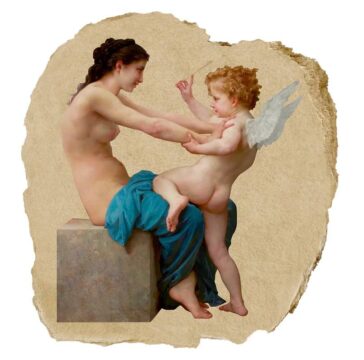






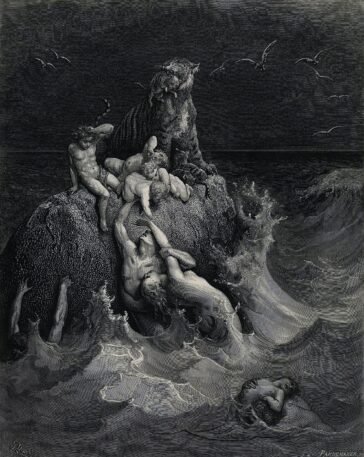
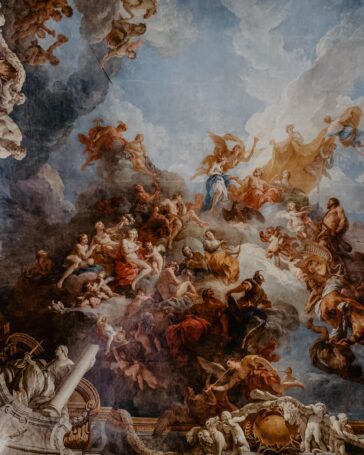
Comments